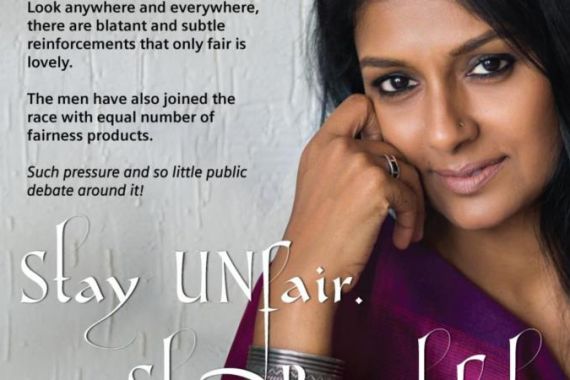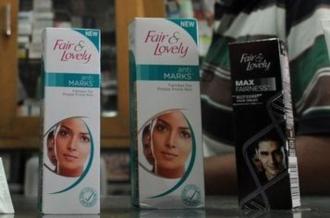Fighting India’s ugly fancy for fair skin
Activists launch “Dark is Beautiful” campaign to counter deep-rooted bias towards lighter complexion.

Rosalyn D’Mello, a journalist based in India’s capital New Delhi, still recalls how her family and friends used to mock her because of her dark complexion when she was a young girl.
“They used to call me kaali (black), ‘blacky’ and even ‘negro’ because of my dark skin,” she said.
“My mother was cruel about my skin shade. She wanted me to use ‘Fair and Lovely’,” a skin lightening cream,” D’Mello said. “I don’t believe in the norm that equates beauty with skin colour.”
Millions of Indians, overwhelmingly women, face biases like D’Mello on a daily basis.
To counter deeply held cultural perceptions on race and beauty, Women of Worth (WOW), a non-governmental organisation based in the southern city of Chennai, promoted a campaign called “Dark is Beautiful” with renewed vigour in August to highlight the issue.
Though the campaign was initially launched in 2009, it gained prominence this year after Bollywood actress Nandita Das backed the campaign with a string of print advertisements that called on every Indian to “Stay Unfair, Stay Beautiful”.
“I have always been very outspoken about this issue, but till recently it was more informal,” Das, known for critically acclaimed films such as “Fire” and “Earth”, told Al Jazeera in an email interview. “As the issue impacts so many people, young girls in particular, by default I have become a champion of it.”
“I have had directors and camerapersons telling me that it would be good if I made my skin lighter as I was playing an educated upper class woman.”
The initiative has received a lot of attention after Das announced her support. Thousands of people have signed the petition and the popularity of the “Dark is Beautiful” Facebook page has been growing.
Colour bias
“It should be seen in the context of caste system that maintains through a variety of ways to exploit the labour or oppressed castes, who happen to have darker skin compared to the upper castes,” Kavita Krishnan, Secretary of the All India Progressive Women’s Association (AIPWA), told Al Jazeera.
Read our full interview with Indian actress Nandita Das
“Colonial rule and its overt racism has been adopted and integrated into the society and compounded by the caste attitude. There is this caste sense of superiority, despite Indians’ default setting being dark.”
The deep-rooted colour bias has ensured that in certain professions such as aviation, films and many other white collar jobs, people with fair skin are generally the preferred choice.
In the western state of Maharashtra, about 100 tribal girls, who were trained to be airhostesses and cabin crew under a government scholarship programme aimed at empowering them, were denied jobs apparently because of their darker skin colour.
Only eight of them landed jobs, but only as ground staff, according to a report by the Indian Express newspaper.
Marriage, which in India’s case is mostly arranged, is an ordeal especially for women as looking fair is the dominant theme.
Matrimonial advertisements reflect this social trend where potential brides and bridegrooms with fair complexion are the most in demand. In fact, skin colour seems to have become as important a marker as age and occupation.
“Women are treated as an asset (or parayadhan which means “others’ wealth”) by the traditional Indian household,” Krishnan said.
Fairness creams
An array of leading Bollywood stars endorse various skin whitening creams often with very regressive messages that end up promoting prejudice around skin colour and looks.
Cultural preference to look “beautiful” and the burden of fairness predominantly falls on women,forcing millions into using skin lightening creams such as “Fair and Lovely,” introduced in early 1970s.
 |
| “[My mother] wanted me to use ‘Fair and Lovely’,” a skin lightening cream,” Rosalyn D’Mello said. [AFP] |
The Indian fairness cream market generates revenue of more than $400m and has been growing by 20 percent annually, according to Bloomberg.
According to another report by the Associated Chambers of Commerce and Industry in India, the cosmetics industry is poised to double by 2014 to $3.6bn.
The cosmetics business has capitalised on peoples’ insecurity, critics says, alleging the industry has been running insensitive and irresponsible campaigns to allure new customers.
Last year, public outcry erupted after a cosmetics firm launched a cream to lighten the skin around the vagina.
“The glorification of the fair skin has been there in our films for long, long time. But it only reflects the bias of the society,” Das said.
Campaigns
But there are many among the film fraternity who have come out against these trends.
Bollywood filmmaker Shekhar Kapur, who directed films such as “Bandit Queen” and “Elizabeth”, last year started a campaign with the Twitter hashtag “adswedontbuy” to protest against irresponsible ads, including ads for skin whitening creams. Millions joined the discussion within a period of 24 hours.
Be yourself and be comfortable in your skin. Don’t let anybody rob you off your self-esteem.
The campaigners behind “Dark is Beautiful” have also filed a petition with change.org asking Emami, a cosmetics company, to take down an advertisement promoting Fair and Handsome, a fairness cream for men.
Bollywood star Shahrukh Khan, who features in the ad, tosses a tube of the fairness cream to a youngster telling him that fairness is the secret to success in life.
An email request to the makers of “Fair and Handsome” cream to comment on the story was not answered at the time of publication of this article.
WOW’s founder Kavitha Emmanuel said activists plan to partner with like-minded organisations across India to bring the issue into the mainstream.
“Shahrukh is a national icon and if he leads the change he would be making a huge statement. We are trying to get in touch with him,” she said.
In the past two decades, India has seen impressive growth: its middle class has burgeoned and more people, including women, go to universities and are part of the workforce.
However, many other prejudices such as colour bias and gender issues are still entrenched in the society.
“Caste attitudes have not eroded from the educated class,” Krishnan said. “Regressive attitudes thrive among [the] privileged class.”
Thanks to the campaign, many men and women, who have gone through discrimination themselves, have come out and blogged about their experiences.
For many like D’Mello, the shades of their skin have not stood in the way of their success, but for millions of other women the skin tan does become hurdle in their way to empowerment.
“Now the colour of my skin has become a very large part of life, it has become my identity,” D’Mello said. “It no longer bothers me.”
Follow Saif Khalid on Twitter: @msaifkhalid
This feature is a part of our ongoing special India coverage. To read more stories click here.